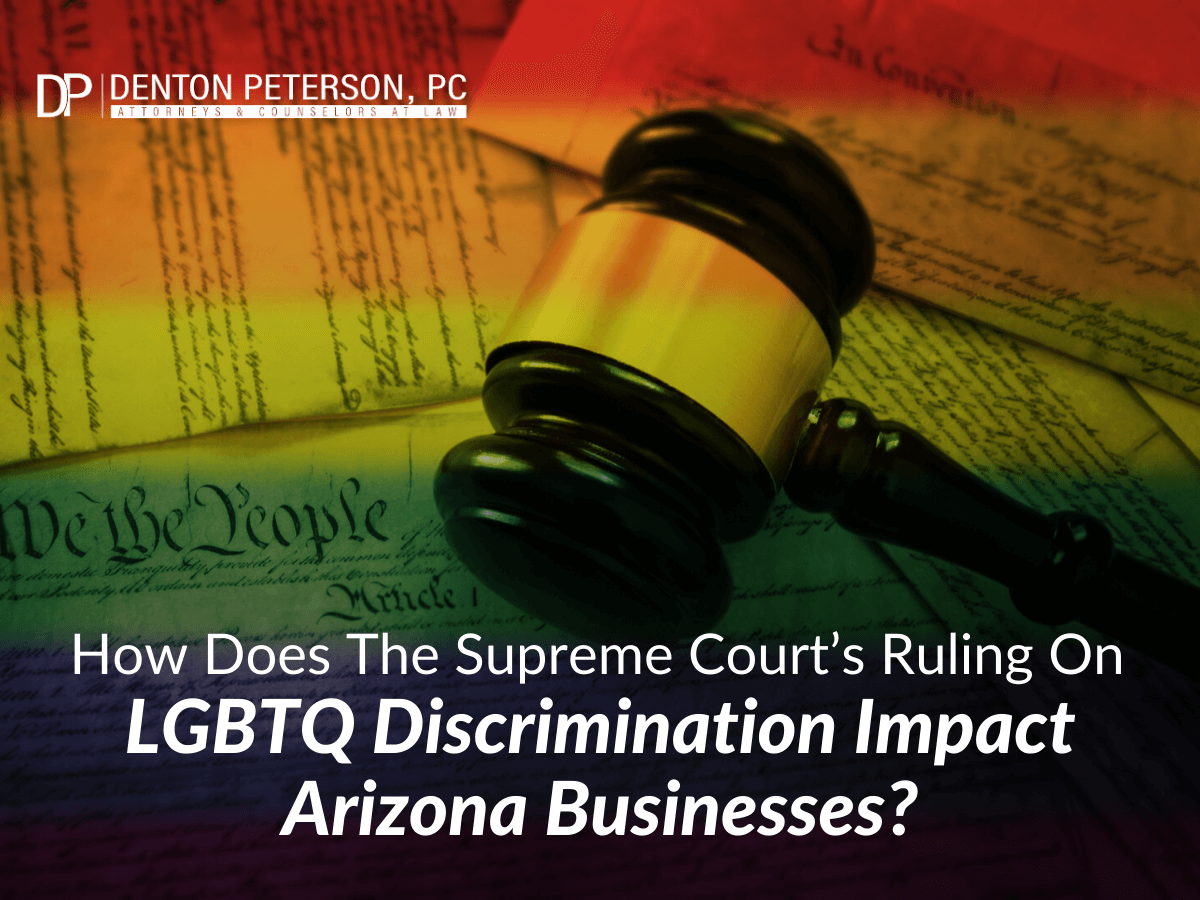How does the Supreme Court’s ruling on LGBTQ discrimination impact Arizona businesses?
This week, the Supreme Court handed down a landmark decision about Title VII of the Civil Rights Act of 1964: the law’s prohibition on discrimination on the basis of sex extends to sexual orientation. The 6-3 decision was written by Justice Neil Gorsuch, who was joined by Justice Roberts along with the four liberal Supreme Court Justices. In his opinion, Justice Gorsuch stated that under the law employers may not “fire someone simply for being homosexual or transgender.” The ruling extends to any kind of workplace discrimination against someone because they are homosexual or transgender. Our Scottsdale employment lawyers are here to explain what this ruling entails.

What this means for Arizona employers
Employers should make sure to review their current employment policies in light of the new decision. Policies contained in handbooks and other manuals need to reflect the change in the law and should have adequate provisions against discrimination and harassment on the basis of sexual orientation. Employers should not assume their policies are broad enough to cover the new anti-discrimination requirements but should instead make sure their policies contain specific prohibitions against discrimination of homosexual and transgender persons. At Denton Peterson Dunn, our Arizona employment attorneys have written many, many employment handbooks and policies over the years, and are working with our clients to make sure they are covered, given this new change in the law.
It is important to remember that liability can arise not only from the actions of an employer, but also an employer’s agent (that is, its employees). So it’s also important for Arizona employers to begin addressing LGBTQ discrimination during employee anti-harassment and other trainings. Employees need to understand that the employer has clear policies prohibiting discrimination against homosexual and transgender co-workers. This is because harassment or discrimination by a coworker can lead to workplace sexual discrimination claims. This can be true even where the employer has comprehensive anti-discrimination policies in place. At Denton Peterson Dunn, our employment lawyers in Arizona conduct workplace trainings and seminars to make sure that if there is an allegation of discrimination by a co-worker, employers can avoid or minimize liability by showing that they took reasonable steps to prevent it.
Potential implications under Arizona law
The Supreme Court’s decision is a decision based on the 1964 Civil Rights Act, which is federal law. Arizona has its own state civil rights law, the Arizona Civil Rights Act, passed in 1974. Although the Supreme Court’s decision does not directly impact the meaning of the Arizona Civil Rights Act, it is likely to have a big impact on Arizona state law nonetheless.
The Arizona Civil Rights Act, like the 1964 Civil Rights Act, prohibits discrimination based on “sex.” Until the Supreme Court’s recent decision, this meant gender only, and did not extend to sexual orientation. Thus far, Arizona courts have also held that the meaning of “sex” within the Arizona Civil Rights Act is limited to gender. However, Arizona state courts have regularly looked to Supreme Court and other courts interpreting the Civil Rights Act when deciding cases brought under the Arizona Civil Rights Act. Therefore, it is likely that the Supreme Court’s recent decision could influence the way Arizona courts decide cases under the Arizona Civil Rights Act in the future. Our employment attorneys in Gilbert are prepared to assist you with navigating these provisions.
Regardless of Arizona court decisions under the Arizona Civil Rights Act, discrimination based on LGBTQ status is against federal law. However, should Arizona courts decide to expand the coverage of the Arizona Civil Rights Act to be consistent with federal law, this may mean that the protections for LGBTQ persons under Arizona law is greater than under federal law. This is because the Arizona Civil Rights Act provides additional protections and remedies to discriminated persons compared with the federal statute. One of these expanded protections is that the Arizona Civil Rights Act can extend to even very small businesses, with few employees. Typically, the federal and Arizona Civil Rights Acts apply only to those businesses with 15 or more employees. However, Arizona’s Civil Rights Act prohibits sexual harassment even where the employer employs less than 15 employees. Therefore, if Arizona courts decide to follow the Supreme Court’s reasoning and apply it to the Arizona Civil Rights Act, even employers with as few as one employee should be prepared to comply with the new anti-discrimination requirements. Consult with the Arizona employer attorneys at Denton Peterson Dunn to learn more about these requirements.
Possible religious exemptions?
Justice Gorsuch’s majority opinion did conclude with certain caveats to the Supreme Court’s ruling. Especially important was his indication that certain employers may have valid religious exemptions from the new interpretations of the Civil Rights Act. Justice Gorsuch noted, however, that the clash between the Civil Rights Act and religious liberties was nothing new and could be handled by the courts. Justice Gorsuch specifically identified the 1993 Religious Freedom Restoration Act (RFRA) as a potential avenue for employers who might object to the new requirements of the Civil Rights Act on religious grounds. At this point, however, we can only wait to see how this new decision impacts the relationship between civil rights and religious freedom.
Get legal advice
If you’re an employer who’s unsure about the impact of the new Supreme Court decision and how to move forward, Denton Peterson Dunn is here to help. Our Gilbert employment attorneys have handled all sorts of employment matters, and have assisted countless business owners with conducting training, drafting employment policies, and completing other business documents to ensure compliance with federal and state law. We’d be more than happy to help you too in light of the new legal landscape.

Brad Denton – Denton Peterson Dunn
1930 N Arboleda #200
Mesa, AZ 85213
Office: 480-325-9900
Email: [email protected]
Website: https://arizonabusinesslawyeraz.com